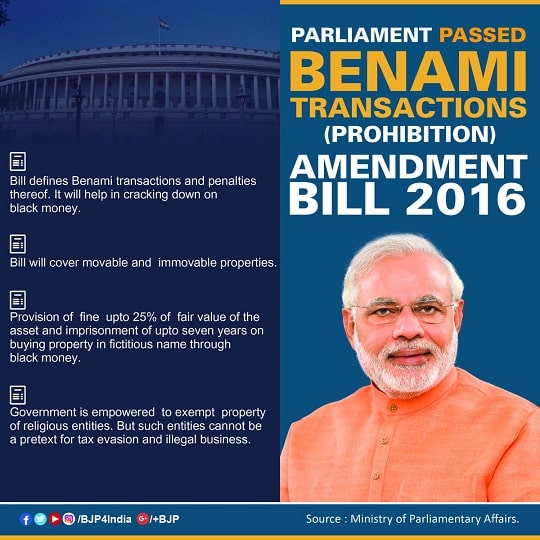“We will take action against ‘benami’ property. This is major step to eradicate corruption and black money… We are going to take action against the properties which are purchased in the name of others (benami). That is the property of the country. My government feels that it is our responsibility to help the poor and I will do it” said PM Modi on Nov 13, 2016 in Goa. This article answers what is Benami? What is Benami act? What is Benami property? How Benami Act will curb Black Money?
All About Benami Property
Benami essentially means without a name, typically used for property. In this kind of transaction the person who pays for the property does not buys it under his/her own name. The person on whose name the property has been purchased is called the benamdar and the property so purchased is called the benami property. The person who finances the deal is the real owner. The property is held for the benefit – direct or indirect – of the person paying the amount.
What is Benami Act?
Benami Transactions Prohibitions Act of 1988 states the following transactions within the premises of this law:
- Any transaction in which property is transferred to one person for a consideration paid or provided by another person.
- Property can be movable or immovable, tangible or intangible and includes any right or interest in such property.
- Transfer of property in the name of wife and unmarried daughter for the benefit of wife and daughter is excluded from the provisions.
- Transfer in the name of coparcener for the benefit of other coparceners for HUF and transfer to trustee for the benefit of trustor are excluded from the provisions.
The Benami Transactions (Prohibition) Amendment Bill, 2015, introduced in the Lok Sabha in May 2015 amended the Benami Transactions Act, 1988. The bill amended the definition of benami transactions, establish adjudicating authorities and an Appellate Tribunal to deal with such transactions, and specify the penalty for entering into these. It empowers the government to confiscate benami property.
- The Bill established four authorities to conduct inquiries or investigations regarding benami transactions: •
- (i) Initiating Officer, • (ii) Approving Authority, • (iii) Administrator and • (iv) Adjudicating Authority 4
- Initiating Authority -> Approving Authority=> Hold property for 90 days and Refer case to Adjudicating Authority.=> Administrator (To manage or appropriate)
- Appellate Tribunal
- Rigorous imprisonment of one year up to seven years, and a fine which may extend to 25% of the fair market value of the benami property.
- Providing false information to be rigorous imprisonment of six months up to five years, and a fine which may extend to 10% of the fair market value of the benami property.


4 responses to “Black Money : What is Benami Property and Benami Act?”
property bought from money gifted by siblings, is it a benami property ?
19 RBI Branches Still Allows Exchanges of old Rs 500 and Rs 1000 Notes and its Branch Address.
More info@ https://www.moneydial.com/blogs/19-rbi-branches-still-allows-exchanges-of-old-rs-500-and-rs-1000-notes-and-its-branch-address/
23 Places Where You can Use Old Rs 500 Note Till 15 Dec: Demonetisation Updates on 25 Nov.
More info@ https://www.moneydial.com/blogs/23-places-can-use-old-rs-500-note-till-15-dec-demonetisation-updates-25-nov/
Exit from Benami Properties is being tough for Black Money holders.
More info@ https://www.moneydial.com/blogs/exit-benami-properties-tough-black-money-holders/